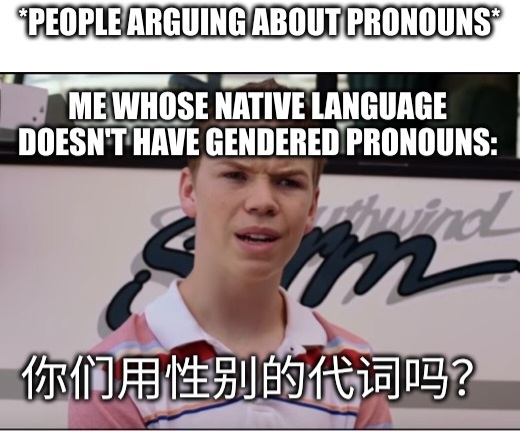this post was submitted on 30 Aug 2023
617 points (100.0% liked)
Memes
1360 readers
61 users here now
Rules:
- Be civil and nice.
- Try not to excessively repost, as a rule of thumb, wait at least 2 months to do it if you have to.
founded 5 years ago
MODERATORS
you are viewing a single comment's thread
view the rest of the comments
view the rest of the comments

This always confused me, even as a native speaker so I looked it up some. Ultimately it's because modern German is the confluence of multiple older, historic languages one of which came from a tree with a strict male/female rule for nouns while the other one's grammar defaulted to a neutral case.
As languages merge or adopt from others they often becomes a conjoined mess of multiple rules coexisting at the same time. A contemporary example is that in English the plural of a word is usually formed by attaching the suffix "s" to the singular form, aka house becomes houses. However there's plenty of exceptions (mouse, mice) in particular if the words stem from a different language (octopus, octopi but nowadays octotuses is also acceptable). In that sense to people not privy to the etymology of words and who only study/learn the language per se there would be no perfectly accurate mechanism to predict the plural of a word.
Also bonus content:
singular: "das Mädchen" (neutral) - the girl
plural: "die Mädchen" (female) - the girls
So in the plural form you have to use a female article again, but the actual spelling of the word is unchanged. Go figure 🤷♂️ 🇩🇪.
The simple past of read is read, but you pronounce it like red. I assume ever language on earth has its quirks.
"Die" is always the plural article:
DAS Auto - DIE Autos / DER Baum - DIE Bäume / DIE Fliege - DIE Fliegen /
In plural every gender has the article "die"
Well at least it consistently unlogical. But wait: it actually depends on the grammatical case for example:
die Mädchen = the girls das Haus der Mädchen = the house of the girls // the girls' house
So depending on context male, female, neutral articles are all used (der Mädchen, die Mädchen, das Mädchen) 🤷♂️
That's not a male article, that's the genitive plural article
It was to make the male seem more important. Even in English the word "woman" comes from "wife man". Everything was about the pecking order in history. Gender bias was a major part of that.
That's a misrepresentation of old English. Man used to be neutral, and was modified by were and wif respectively for man and woman. Wife comes from woman, not the other way around.